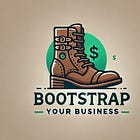Bootstrap Your Business is a Substack community dedicated to supporting new and aspiring business owners with the process of starting, setting up, and operating a small business.
Join me on this Journey with DIY instructional content, commonly used templates and reusable files, and coaching advice! It’s all here!
Go to my Substack Home Page for additional resources for entrepreneurs and solopreneurs: 👇
Did you know…?
Recession startups survive longer and grow faster in the long run
The Great Recession of 2007-2009 had significant and positive long-term effects for innovative startups. [Studies] show that startups born during the Great Recession are 12.1% more likely to survive to their seventh anniversary compared to startups born in other years between 2002 and 2012. Moreover, over their first 7 years of operation, recession startups experienced higher employment and sales growth, outpacing expansion startups by 35.2 and 35.7 percentage points, respectively. (source)
In this newsletter, I’ll explain why NOW is a great time to start your business — despite economic uncertainty, the likelihood of an economic recession, a volatile stock market, and other major global events that are in progress.
Specifically:
Why NOW is the best time to start a business
Many successful businesses were born during recessions
When losing a job can lead to successful entrepreneurship
The 4 advantages of starting a business during a recession
Long-term impacts of business ownership on entrepreneurs and their families
How to build a recession-proof business (hint: you need a solid business plan)

👉 Also, be sure to check out these resources:
Bootstrap Your Business Workflow - a step-by-step guide with the links to all of the top daily posts that walk you through the process from scratch
BYB Book Recommendations - a collection of the best business books to help you on your entrepreneurial journey
BYB Alerts & News - urgent updates for self-employed and business owners - delivered to your inbox - so that you can be more prepared
BYB Documents - a repository of guidance for important business documents with instructions and guides to use them in your self-employment journey
The Best Time To Plant A Tree
I’m sure you’ve heard:
"The best time to plant a tree was 20 years ago. The second-best time is today." (anonymous)
The saying emphasizes the importance of taking action now, even if you feel like you've missed an ideal opportunity in the past.
Since we have no way (yet) to travel backwards in time, the second best option is all you have, and the topic of this newsletter.
Historical Precedents
Throughout history, numerous successful companies have emerged during economic downturns, demonstrating that recessions can be fertile ground for innovation and entrepreneurship.
Notable examples include:
General Electric (1890): Founded by Thomas Edison during a period of economic instability, GE has grown into a multinational conglomerate.
Microsoft (1975): Established by Bill Gates and Paul Allen during the oil embargo recession, Microsoft revolutionized the personal computing industry.
Netflix (1997): Launched during the late 1990s recession, Netflix transformed media consumption and is now a leading streaming service.
Airbnb (2008): Founded during the Great Recession, Airbnb disrupted the hospitality industry by offering alternative lodging options.
Uber (2009): Founded right after the crash of 2008, Uber focused on serving an audience that was seeking ways to save money on transportation.
Starting a business during a recession might seem counter-intuitive, but history and economic patterns suggest it can be a strategic move.

Job Loss as the Trigger
Recessions often lead to increased unemployment, which prompts many unemployed individuals (or those fearing unemployment) to consider entrepreneurship as a viable alternative to traditional employment.
This mindset is often referred to as "necessity entrepreneurship".
Economic downturns reflects this trend, as displaced workers leverage their skills and experience to create new business ventures.
Shifting to entrepreneurship makes it possible to earn an income while simultaneously contributing to economic recovery through innovation and job creation.
In other words, the loss of a job could indirectly lead to innovation and growth over the long-term.
Advantages of Starting a Business During a Recession
Aside from finding a new way to make money after a job loss, there are other hidden benefits of starting a business—especially during an economic recession.
Access to Talent
Economic downturns result in a larger pool of available, skilled professionals due to layoffs, enabling startups to build strong teams.
Also, talented staff who were not affected directly by layoffs may be seeking new opportunities as their current employer shows signs of weakness when their colleagues lose jobs.
Reduced Competition
Many companies scale back during recessions, leading to less competition and more market opportunities for new entrants.
Big companies with big overhead (costs) find themselves exposed to greater risks and are too big to pivot quickly.
Cost Savings
Lower demand can lead to decreased costs for goods and services, allowing startups to operate more efficiently.
Smaller, more nimble companies and startups with low overhead can offer discounts, deals, or other strategies to land new clients.
Market Gaps
Recessions can expose unmet needs and inefficiencies in the market, providing opportunities for innovative solutions.
Recessions bring change, and change leads to opportunity.

Long-Term Impacts of Business-Ownership
Economic downturns often present unique opportunities for entrepreneurs willing to navigate the challenges.
It really is a mindset change to become a business owner.
When a “Job” is No Longer a Stable Solution
Many people who are accustomed to the stability of a full-time “job” may find that the stability they once felt about their situation is no longer viable when times get lean.
Companies that once referred to their staff as “family” struggle when they have to terminate those relationships in order to survive economic downturns.
Believing that a “job” is stable at all is a hard lesson learned when layoffs are rampant, and you are the one who has contributed to unemployment statistics.
Pivoting Towards a Better Option
After losing a job, the most important thing you can do is rise up and move forward.
The journey towards entrepreneurship during a recession can have profound long-term effects on yourself and your family.
Some of the greatest benefits of entrepreneurship include:
Financial Growth: Successful businesses can significantly enhance a family's net worth over time, providing financial stability and wealth accumulation that were never possible with a full-time job.
Personal Fulfilment: Building a business aligned with personal values and goals can lead to greater personal satisfaction, a sense of accomplishment, enhanced self-reliance, and financial independence.
Work-Life Balance: Entrepreneurship offers the flexibility to design a “workstyle” built around family commitments, personal hobbies, time to rest and recuperate, and health and wellness.
Legacy Creation: Establishing a family business can create a lasting legacy, offering opportunities for future generations and instilling entrepreneurial values.
Passive Income: While most entrepreneurs are “Go-Getters” who spend a great deal of time building and managing their operations, early investment can lead to long-term rewards that pay dividends later in life.
Building a Recession-Proof Business Plan
A well-crafted business plan that includes risk mitigation for economic downturns can be a security blanket for long-term success, especially when launching during a recession.
Strategic planning can help you anticipate potential challenges, such as:
reduced consumer spending
supply chain disruptions
tightening credit markets
currency inflation
market volatility
and more…
The goal of a business plan that includes risk mitigation is to build flexibility into your business operations so that you can pivot and survive (or thrive) in times of change.
By outlining contingency plans, such as diversifying revenue streams, maintaining lean operations, and securing multiple financing options, businesses can pivot quickly if economic conditions worsen.
If you enjoyed reading this newsletter, and aren’t ready to become a subscriber, you can leave a tip. :-)
Share your thoughts in the comments if you found something useful or want to add more color to the topic.






